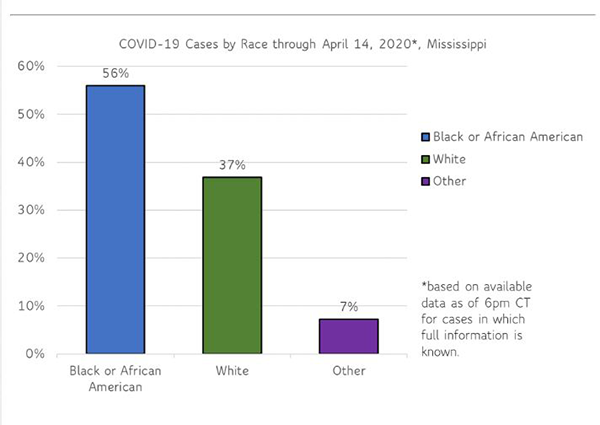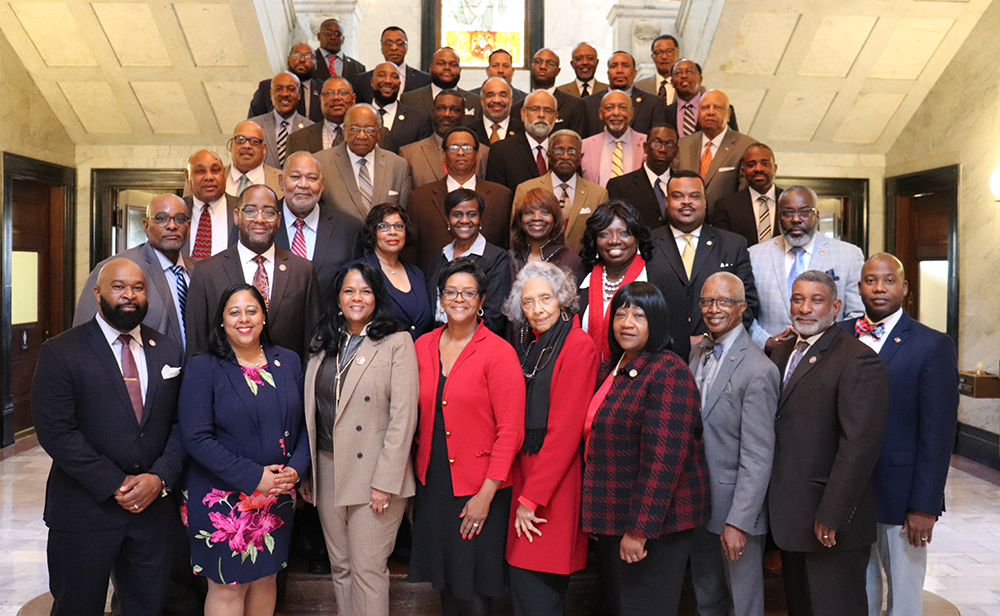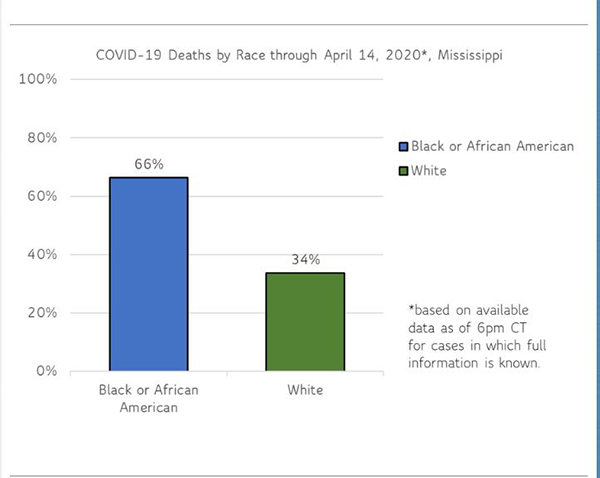
By Gail M. Brown,
Contributing Writer,


 “COVID-19, What It Means to You” was the title of an online video-conference-call forum called DIGITAL DIALOGUE organized and hosted by the Mississippi Legislative Black Caucus recently.
“COVID-19, What It Means to You” was the title of an online video-conference-call forum called DIGITAL DIALOGUE organized and hosted by the Mississippi Legislative Black Caucus recently.
“We received hundreds of calls,” said MLBC Chairperson Senator Angela Turner-Ford. “I was surprised by the overwhelmingly positive response.
“Caucus members and our colleagues have been bombarded with questions about the coronavirus, unemployment issues, the coronavirus stimulus package, etc.,” she said. “We thought it was important to assemble a panel of experts who could address specific issues in a manner that was succinct and easy for our constituents to understand.”
One of the issues that Turner Ford said the presenters did not shy away from is the “disparate impact COVID-19 is having on African Americans.”
According to the most recent data before ML’s press time, April 15, the Mississippi State Department of Health (MDHS) reported 3360 confirmed cases of COVID-19 and 122 deaths. Of those cases, 56% are African Americans, 37% white and 7% others. Of those death, 66% are African Americans and 34% are whites. (See tables from MDHS website).
The first panelist to present was Thomas Dobbs, III, M.D., MPH, Mississippi State Health.
Dobbs said of all the Mississippi cases, 56 percent are African American. He stated, “The case rate [among African Americans] is … about double that of white folks. My suspicion is [its] because of a lack of healthcare access for a whole host of reasons. Even more alarming, we see that the death rate (72% black and 28% white) has been a whopping, lopsided mortality in African-American folks.”
Reacting to the digital meeting, Sen. Barbara Blackmon said, “as a result of the State Health Officer, Dr. Thomas E. Dobbs, III, confirmed what we already knew, that our community is the hardest hit because of lack of access to quality healthcare, perhaps, introducing legislation that can become law to address our healthcare needs.” Blackmon serves on the legislative Medicaid Committee.
In reference to introduced legislation, Sen. Turner Ford said in a recent interview, “Early during this legislative session, the [55-member] caucus released its policy agenda which specifically addressed the healthcare needs of African Americans throughout the state. The first item listed is the expansion of Medicaid. Another item on the caucus’s policy agenda is funding for the Program of All-Inclusive Care for the Elderly (PACE). The PACE program would allow eligible disabled and senior citizens to receive various services from the comfort of their homes, instead of as residents of nursing, convalescent or personal care homes.”
The outbreaks in such facilities are alarming. April 15, MDHS-published data indicating 66 long-term care (LTC) outbreaks statewide.
Blackmon also emphasized, “While we understand that this coronavirus is no respecter of persons, the caucus knows that if our healthcare needs in our community are addressed, the larger community shall benefit as well.”
Also, during Dobbs’ presentation, he described COVID-19 as basically a virus that causes flu-like illnesses. The symptoms are pretty much identical with some variations. “It will typically cause some coughing and congestions. Most people get over it just fine. Probably 99.8 percent will recover at some point,” he said. However, “the scary thing about it is that when people who are vulnerable, especially people who have chronic underlying medical issues, or may be old” … that’s when we see high mortality rates.
“It spreads in a lot of ways very similar to influenza,” he said. If someone has the virus, they can cough or sneeze into the air, and somebody near them breathes it in or gets it on their eye, that can be a transmission. “Or, [the person with the virus] can contaminate something like a table or some environmental object that people are around. So, the other person touches it [and] contaminates their face. Then they will get sick.”
He said that this is why such “an aggressive social distancing” is in place, along with the 20-second hand-washing hygiene, covering one’s coughs and sneezes, using hand sanitizer, etc.
The state health officer stressed that if one gets sick to “stay home from work or school.”
COVID-19 does not make young people dramatically sick but they can get it and spread it. If they spread it among elderly family members with heart disease or other chronic illness, they will become infected. That is when “we see a lot of severe illnesses” that leads to COVID-19 deaths.
Other panelists included: Sandra Carr Melvin, DrPH, MPH, health chair, MS State Conference NAACP; Janice Sherman, CEO, Community Health Center Association of Mississippi; Aurelia Jones-Taylor, CEO, Aaron Henry Community Health Services Center, Inc.; John A. Fairman, CEO, Delta Health Center, Inc.; Cindy Lawrence, director, Lowndes County Emergency Management Agency; John Horhn, chair of Senate Labor Committee; William Bynum, Hope Credit Union, Hope Enterprise, Hope Policy Institute; and J.R. Jones, chair of Small Business Fund of Mississippi, Inc.
They provided listeners with a wealth of need-to-know information pertaining to and as a result of this horrific healthcare crisis.
For the thousands seeking unemployment benefits, Horhn said qualifying recipients can receive as low as $30/week up to $235/week in regular state benefits plus the $600 COVID-19 unemployment benefits through July 31. “The state has eliminated the one-week wait and the job search requirements but you still may have to check in to let MDES know that you are still unemployed,” Horhn said.
To make the application process less complicated, he suggested going online. Google: COVID-19 Unemployment, click on the State of Mississippi and then the link that reads, “Disaster Unemployment Assistance.” Or, applicants may call the toll-free number 888-844-3577. He also said that 85 additional MDES workers have been hired for the MDES call center.
The senator digressed to raise the concern that there is a lot of money coming to Mississippi. “It’s in the billions of billions of dollars, and one of the things that I am seeing as I observe what’s going on is that there are none who look like us at the table where these decisions are being made and he thinks the caucus should take an active position with regard to that.”
Melvin of the NAACP stressed to everyone that “COVID-19 is a pathogen and extremely contagious.” Diabetes, hypertension, obesity and cardiovascular disease have all been demonstrated as what makes COVID-19 worse.
Most of the rural community health panelists shared similar concerns for needing enough COVID-19 tests and protective gear. “Community healthcare centers are on the frontline,” said Fairman. He urges testing for the symptomatic as well as the asymptomatic.
Jones encouraged small businesses to take advantage of the COVID-19 Paycheck Protection Program (PPP) which is being administered through the banks.
Bynum warned to proceed with caution because he is already seeing an increase in predatory-lending.
Reacting to the virtual outreach, Jackson State University Department of Mass Communication and Media Studies Chair Elayne Hayes-Anthony, said, “I was so pleased that the legislative black caucus had a digital conference about the most important news of the day, COVID-19. It was very informative and all the speakers were outstanding.”
As a member of the State Board of Health, she said, “Dr. Dobbs is not only an excellent epidemiologist but a knowledgeable and careful State Health officer as well. He is uniquely aware of the health disparities that face African Americans and is willing to address that in our community.”
MLBC Chairperson Turner-Ford stated in a recent interview, “We will also advocate for fair spending of coronavirus stimulus dollars from the federal government.”
If you missed or could not get on the MLBC Digital Dialogue: COVID-19 What it Means to You, you may listen on YouTube at the following URL: https://youtu.be/pLxulg2adEw

Be the first to comment